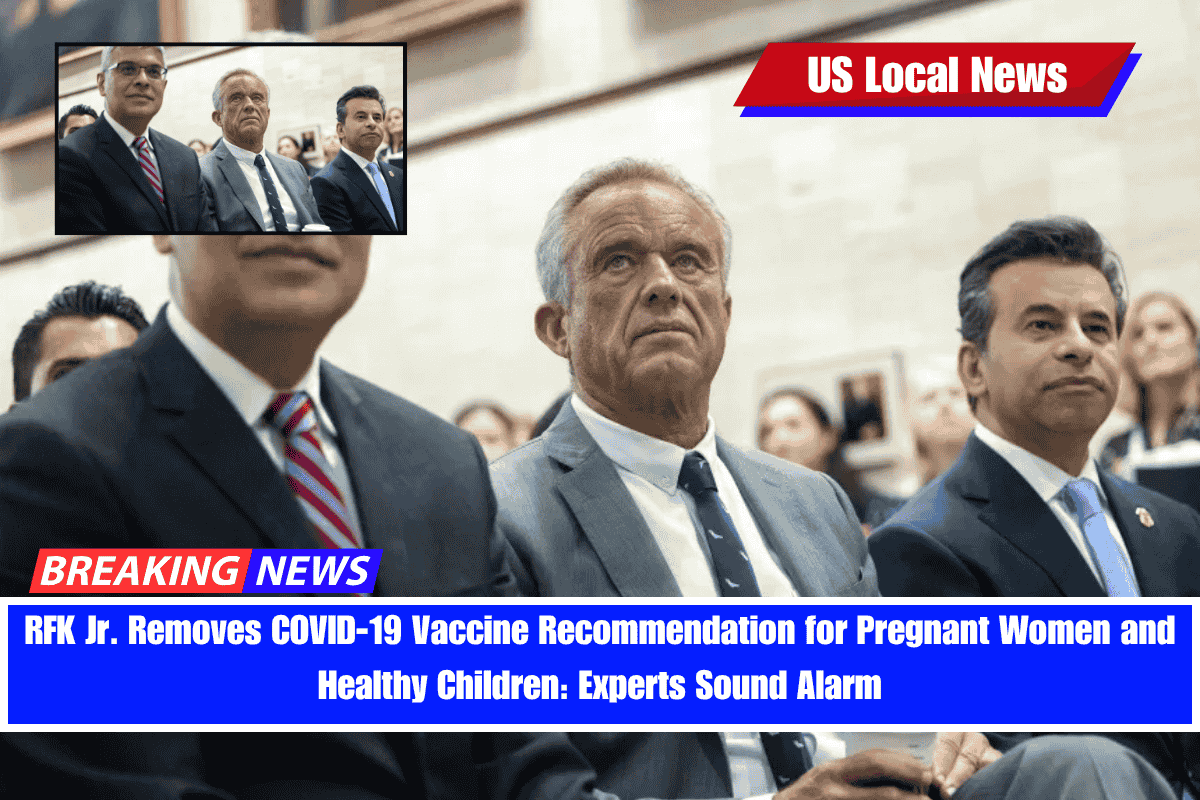On Tuesday, U.S. Health and Human Services Secretary Robert F. Kennedy Jr. announced a major policy shift: the COVID-19 vaccine is no longer recommended for healthy children and pregnant women on the CDC’s immunization schedule.
This unexpected change was revealed in a brief social media video and immediately sparked widespread concern among medical experts and public health leaders.
What the Policy Change Means
Kennedy, joined by FDA Commissioner Dr. Marty Makary and NIH Director Dr. Jay Bhattacharya, stated that the removal of the COVID-19 vaccine for these groups was due to a lack of supporting clinical data, particularly regarding repeat booster doses in children. However, no new scientific evidence was presented to justify the change.
This announcement represents a major departure from the CDC’s current guidelines, which still list the COVID-19 vaccine as recommended for all individuals aged six months and older, including pregnant women, who are considered high-risk for serious complications from the virus.
Medical Community Pushes Back
Doctors and scientists across the country reacted with alarm. Dr. Steven Fleischman, president of the American College of Obstetricians and Gynecologists, firmly stated that the science supporting COVID-19 vaccination during pregnancy has not changed.
Vaccination, he said, protects both mothers and their infants, especially babies under 6 months who are too young to be vaccinated themselves.
Other experts emphasized that Kennedy’s decision overrides the established process for vaccine recommendations. Normally, changes are made after review by the CDC’s Advisory Committee on Immunization Practices (ACIP), which evaluates extensive data and clinical trials. Kennedy’s move skipped that step entirely.
Impact on Access and Coverage
The change could significantly affect access to COVID-19 vaccines, especially for low-income families. Under the Affordable Care Act, insurance companies are required to cover vaccines recommended by ACIP. Without a CDC recommendation, insurers are no longer legally bound to cover the shots for these groups.
Additionally, this change may exclude the COVID-19 vaccine from the Vaccines for Children program, which provides free vaccines to children who otherwise couldn’t afford them.
Dr. Paul Offit, director of the Vaccine Education Center at Children’s Hospital of Philadelphia, warned that the decision would lead to reduced availability and affordability, especially for those who rely on public health programs.
Legal and Ethical Concerns
Legal experts and public health advocates are questioning the legality of the change. Dorit Reiss, a law professor at UCSF, stated that the announcement violates administrative law standards. Policy changes like this are supposed to be supported by transparent procedures and clear evidence—not announced in a short video without documentation.
Some expect the move to be challenged in court, especially by states, advocacy groups, or families concerned about their children’s access to vaccines.
Contradicting Past Promises
Kennedy’s decision also seems to contradict his own public statements. In April, he said: “I’m not going to take people’s vaccines away from them. I’m going to make sure we have good science so people can make informed choices.”
Critics like Dr. Offit argue this is exactly what he’s now doing—taking the choice away from families and providers by eliminating an option many rely on.
What’s Next for COVID-19 Vaccine Policy?
The CDC advisory committee had already been reviewing changes to the COVID-19 vaccine guidelines, including shifting to a risk-based recommendation rather than a blanket one. The committee was expected to vote on this in June.
Meanwhile, the FDA is also revising its vaccine approval strategy. A new policy will require placebo-controlled clinical trials for future COVID-19 vaccine updates, especially for healthy children and adults under 65.
The Bigger Picture
Experts say this change could undermine public confidence in vaccines and reverse progress made during the pandemic. Dr. Peter Hotez, a vaccine scientist, noted the irony that a self-described advocate of “health freedom” would impose a top-down restriction that limits options for families.
He added that this new approach removes decision-making from parents and doctors and puts it in the hands of federal bureaucracy—the exact opposite of the freedom-based approach Kennedy claims to support.











Leave a Reply